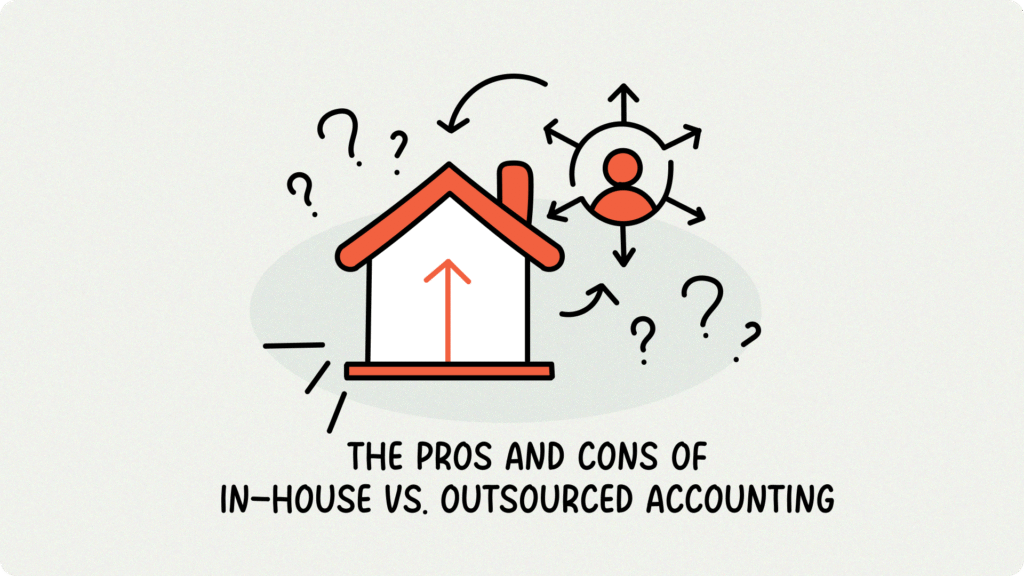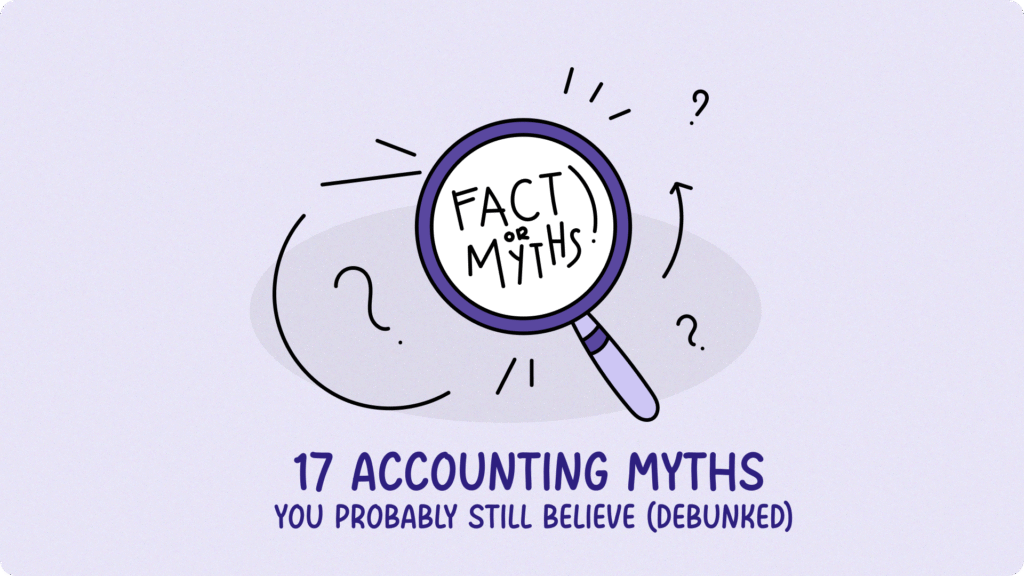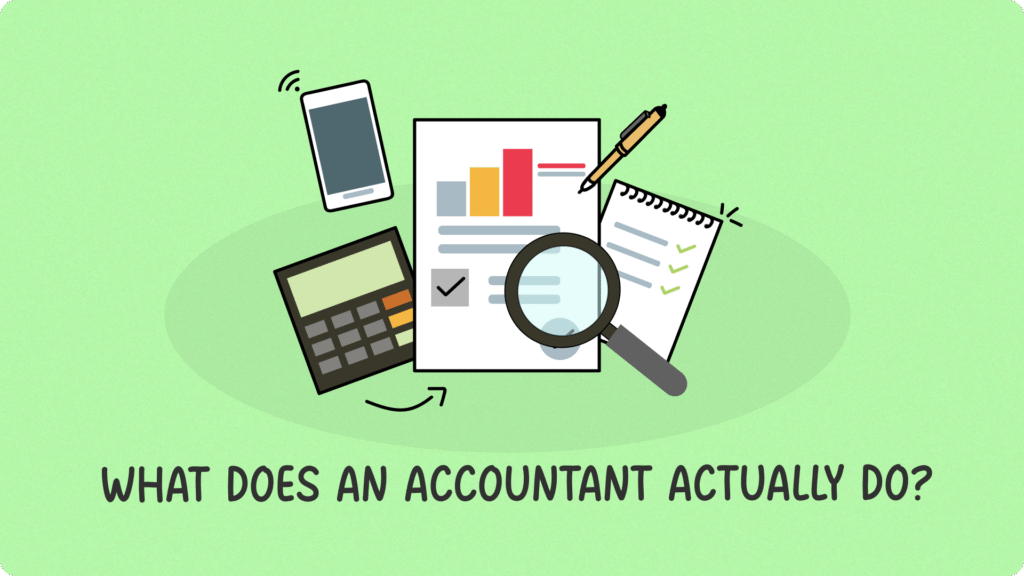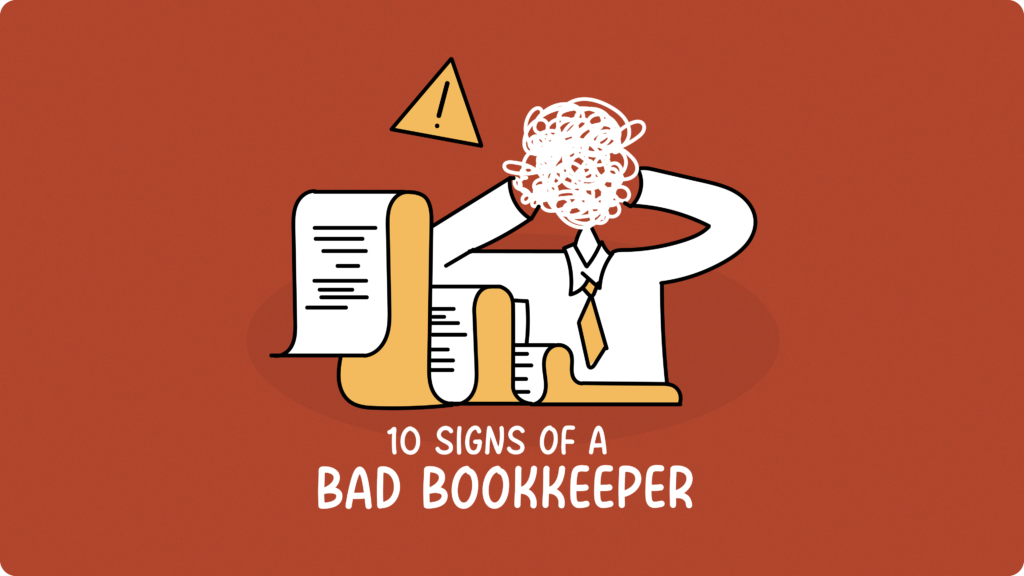The Pros and Cons of In-House vs. Outsourced Accounting

If you’re running a small business, you probably started out as your own “Chief Everything Officer.” That includes being the lead, and only, member of your accounting department. Late nights with spreadsheets and a shoebox full of receipts are a rite of passage for many entrepreneurs. But as your business grows, that system starts to break. The bookkeeping takes more and more of your time, tax questions become more complex, and you start to worry about what you might be missing. You’ve reached a financial crossroads: is it time to hire someone in-house, or should you outsource your accounting to an external firm? This is a major decision, and there’s no single right answer. It’s about understanding your needs, your budget, and what you want your role in the business to be. Let’s break down the pros and cons of each path. Table of Contents The In-House Route This typically means hiring a part-time bookkeeper or a full-time staff accountant. This person is your employee, working within your company on a daily basis. Pros of In-House Accounting: Cons of In-House Accounting: The Outsourced Path Outsourcing means partnering with an external firm (like Fynlo!) that handles your accounting needs remotely. You pay a monthly fee for their services. Pros of Outsourced Accounting: Cons of Outsourced Accounting: Finding the Right Fit: The partnership is crucial. You need to find a firm that understands your industry, communicates well, and feels like a genuine part of your team. TL;DR Comparison: In-House vs. Outsourced For a quick overview, here’s how the two options stack up against each other. Factor In-House Accounting Outsourced Accounting Cost High: Full-time salary + benefits + taxes + software (often $90,000+ total). Flexible: Predictable monthly fee, often a fraction of a salary. Pay only for what you need. Expertise Limited: Expertise is confined to the knowledge of one or two individuals. Broad: Access to a diverse team of specialists (tax, bookkeeping, strategy, etc.). Scalability Difficult: Scaling requires a lengthy and expensive hiring process. Easy: Services can be scaled up or down quickly as your business needs change. Control & Access High: Direct, daily management and immediate on-site access. Structured: Access is through scheduled calls and email. Less direct daily oversight. Response Time Immediate: on-demand support and instant adjustments. Defined: typically within agreed SLA, often same or next business day, and prioritised by urgency. Time Investment High: Requires time for hiring, training, and ongoing management. Low: The firm manages its own team and technology, freeing up your time. Continuity Risky: Operations can halt if your employee leaves or is unavailable. Reliable: Service is uninterrupted by vacations or personnel changes due to team structure. Best For Businesses valuing oversight, data security, and stable finances Businesses seeking cost savings, scalable solutions, and specialized expertise. Which Path is Right for You? The truth is, the best choice depends on your stage of growth. Ultimately, the goal is to get timely, accurate financial information that empowers you to make smart decisions, without draining your time or your bank account. The right solution shouldn’t just do your books; it should give you peace of mind and the freedom to focus on leading your business. Whether you’re considering bringing someone in-house or tapping into outsourced expertise, Fynlo’s advisors can help you weigh the options and find the best fit for your budget and growth plans. Schedule a free consultation today, and let us guide you toward the solution that frees you to focus on what you do best. You may also like these articles:
17 Accounting Myths You Probably Still Believe (Debunked)

Most of us dive into freelancing or small-business ownership for the work itself—designing, consulting, baking. The last thing we signed up for was bookkeeping. Yet every conversation comes with unsolicited “advice” from well-meaning friends or relatives: “Just write off everything!” or “You don’t need records—just save your bank statements.” Those myths don’t just create unnecessary stress—33% of small-business owners report they regularly lose sleep over money worries—and they can cost you real dollars if left unchecked. We didn’t get into business to become accountants, so it’s easy to fall for these misconceptions. Let’s debunk these myths and give you the clarity to manage your finances confidently. Myth 1: Accounting is only for tax season. Reality: Accounting is a year-round activity that gives you a real-time pulse on your business’s health. Why It Matters: Scrambling for records in March or April creates stress, missed deductions, and rushed decisions. Reviewing your books monthly, or even weekly, lets you spot small issues, improve cash flow, and cut costs before they spiral out of control. Myth 2: I’m too small to need formal accounting software. Reality: Spreadsheets are prone to errors and can’t scale with your business. In fact, research indicates that up to 88% of spreadsheets contain significant mistakes. Why It Matters: I’ve been there. My first year I tracked everything in a spreadsheet. A single misplaced formula almost cost me $500 in underreported income. Modern cloud software is affordable, automates data entry, and lets you connect your bank feed, so you save hours and get a clearer financial picture. Myth 3: I can write off 100% of my home-office costs. Reality: You can only deduct the portion of your home used exclusively and regularly for business. Why It Matters: Over-claiming this deduction is a classic IRS red flag. You can choose the simplified method (up to $1,500) or the actual-cost method (allocating mortgage, utilities, insurance). Use whichever yields the bigger benefit, but only for truly dedicated office space. Myth 4: A business credit card can replace a business bank account. Reality: A credit card lets you borrow money, while a bank account is where your business’s cash actually lives. You need both, but a separate business bank account is especially important to manage funds properly. Why It Matters: Mixing personal and business money in one account can strip away your LLC’s liability protection, exposing your personal assets if things go wrong. It also turns bookkeeping and tax preparation into a tangled mess. A dedicated business bank account keeps your finances clear, simplifies reconciliations, and ensures your legal and financial records stay rock solid. Myth 5: I don’t need to save receipts if I have a bank statement. Reality: The IRS requires proof of purchase, and bank statements alone don’t show what you actually bought Why It Matters: Picture an auditor asking what a $200 Amazon charge covered. A bank statement alone won’t prove it was for a printer rather than a TV. Instead, digitize and tag every expense as it happens using receipt-capture apps like Dext or QuickBooks Snap. Myth 6: Profit is the same as cash flow. Reality: Your profit on paper may look healthy, but cash flow measures the actual dollars in your account that keep your business running. It’s a crucial difference, and an Intuit study found that 61% of small-business owners struggle with cash-flow issues. Why It Matters: Your Income Statement can show a big profit, but if clients haven’t paid, you can’t pay your bills. This is the single most critical survival concept. Myth 7: I can pay myself whatever’s left in the business account. Reality: You must set aside money for taxes and business savings before paying yourself. Why It Matters: Following Mike Michalowicz’s “Profit First” principle means you allocate percentages to tax and profit accounts before paying yourself. This approach prevents the panic of facing a large tax bill with no funds set aside. Myth 8: Bartering (trading services) isn’t taxable. Reality: The fair market value of services received in a trade counts as taxable income. Why It Matters: If a web designer trades $2,000 of work for $2,000 of photography, each party must report $2,000 of income. Don’t let “free” trades cost you in unreported revenue. Myth 9: An accountant is too expensive for my small business. Reality: A good accountant saves you more money than they cost. Why It Matters: They prevent mistakes, uncover deductions, and save you hours of work. For example, a $2,000 annual fee is repaid when you reclaim just 40 hours of time—hours you can spend on billable work or growing your business. This makes an accountant an investment, not an expense. Myth 10: My bookkeeper and my tax preparer are the same thing. Reality: Bookkeeping is daily transaction recording, while tax preparation is annual return filing. Why It Matters: Clean, year-round books speed up tax season and reduce preparation costs because your accountant can work directly with accurate, organized records. Myth 11: I can deduct the cost of my commute to my office or co-working space. Reality: Commutes from home to your primary workplace are non-deductible, but you can deduct business trips beyond that, such as driving to client meetings. Why It Matters: Misclassifying personal travel as business mileage invites audit scrutiny. Only log miles driven for business purposes beyond your usual commute. Myth 12: Estimated taxes are optional. Reality: If you expect to owe more than $1,000 in tax, you must pay quarterly estimated taxes. Why It Matters: The U.S. is a “pay-as-you-go” system. Missing estimated payments triggers underpayment penalties—just like an employee missing withholding. Myth 13: Putting ‘LLC’ after my name protects me from everything. Reality: An LLC shields personal assets from business debt, but it doesn’t protect you from professional negligence or from commingling personal and business funds. Why It Matters: If a client sues over an error or omission, your LLC structure will not prevent a negligence claim and your personal assets could still be at risk. Beyond separating business and personal finances,
What Does an Accountant Actually Do? (Explained Simply)

For many small business owners and freelancers, the word “accountant” might conjure images of stern figures buried under piles of receipts, or perhaps someone who just “does taxes.” While tax preparation is certainly a big part of what they do, the reality is that the role of an accountant is far more diverse, dynamic, and crucial to the health of any business, big or small. So, what exactly does an accountant do? Let’s break down their essential functions, explaining simply how they help businesses and individuals navigate the world of finance. Think of an accountant as your financial navigator, helping you understand where your money is, where it’s going, and how to get it where you want it to be. Their responsibilities typically fall into several key areas: 1. Bookkeeping & Record Keeping At the foundation of all accounting is accurate record-keeping. While an accountant might not always handle the day-to-day data entry (that’s often the bookkeeper’s role), they oversee this process to ensure all financial transactions are correctly recorded. This includes: Without meticulous record-keeping, it’s impossible to know the true financial picture of a business. In fact, while 72% of business owners handle their own accounting tasks—from basic bookkeeping to filing taxes—a striking 60% admit they don’t feel knowledgeable about finances and accounting. 2. Financial Reporting & Analysis Once the data is accurately recorded, an accountant transforms raw numbers into meaningful insights. This involves preparing and analyzing key financial statements: Beyond just preparing these, a good accountant will analyze them to spot trends, identify areas for improvement (like cutting unnecessary expenses), and help you make informed business decisions. For instance, they might point out that while you’re profitable on paper, your cash flow is tight, prompting a review of payment terms. This insight is critical, as poor cash flow management is a leading cause of small business failure. Indeed, 60% of small business owners have grappled with cash flow issues in the past year alone. 3. Compliance & Planning for Tax Season Yes, taxes are a major component, but it’s more than just filling out forms. Accountants are experts in tax law and help ensure you comply with all federal, state, and local regulations, avoiding penalties. This includes: Handling Audits: Should the IRS come knocking, an accountant can represent you and expertly guide you through the audit process. While the overall audit rate for individual taxpayers is low, at about 0.44% in 2023, corporate returns face a higher audit rate of 0.74%. 4. Advisory Services Many accountants go beyond historical reporting and become trusted business advisors. They use financial data to help you make forward-looking strategic decisions, such as: Budgeting & Forecasting: Helping you create realistic budgets and financial forecasts to plan for future growth, expenses, and cash needs. Business Planning: Assisting with financial projections for loan applications, investor pitches, or expanding your operations. Pricing Strategies: Analyzing your costs to help you set profitable prices for your products or services. Software Integration & Optimization: Recommending and helping implement accounting software solutions that streamline your financial processes. Risk Management: Identifying potential financial risks and advising on ways to mitigate them. Why Do Freelancers and Small Businesses Need Accountants? While you might start by handling your own finances, as your business grows, the complexity increases. An accountant becomes invaluable for: In essence, an accountant is not just a number cruncher; they are a vital partner who provides clarity, ensures compliance, and offers strategic insights to help your business thrive. Ready to streamline your financial operations or need expert guidance? Whether you’re a budding freelancer or a growing small business, understanding your numbers is key to success. Schedule a call with us today to learn how our solutions can empower your financial management. Further Reading
10 Signs of a Bad Bookkeeper to Absolutely Avoid

Whether you’re a startup or a growing small business, knowing your financial status is key to keeping your business on track. Whether you work with bookkeeping software that offers support, a part-time bookkeeper, or external accountants, it’s crucial to ensure they are doing their job properly, making your life easier, not harder. Good bookkeepers are your financial peace of mind, keeping things organized and making sure you are compliant. But bad ones can drain your profits and intensify your tax nightmares. Is your bookkeeper the right fit? Read on for 10 troubling signs that it may be time to find a new bookkeeping solution. 10 signs of a Bad Bookkeeper Why Fynlo is a Trusted Solution If you’ve recognized one (or more) of the signs of a bad bookkeeper in your current service, it’s time to consider a reliable alternative. At Fynlo, we understand the challenges of financial management firsthand. That’s why we’ve built an intuitive platform designed to simplify your financial life and put you back in control. Fynlo provides access to seasoned accounting professionals. Our junior accountants bring over five years of experience, while our senior accountants boast more than ten years, most honed at top-tier firms like the Big Four, Baker Tilly, BDO, and Grant Thornton. We also prioritize confidentiality and data security. Every client relationship includes a signed Non-Disclosure Agreement (NDA), so your sensitive financial data is protected at all times. Here’s how Fynlo can benefit your business: Click here to schedule a call with our expert and take the stress out of bookkeeping. Fynlo team can handle everything from categorizing your transactions and reconciling your accounts to delivering precise, tax-ready financial statements.